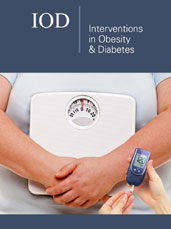- Submissions

Abstract
Interventions in Obesity & Diabetes
Long-Term Safety and People Reported Outcomes of a Long-Duration Implantable CGM System in the US Post Approval Setting
-
Open or CloseKatherine S Tweden1*, Ben Romarowski1, Mark Warren2, Kashif Latif3, Ralph Oiknine4 and Francine R Kaufman5
1Clinical Sciences, Senseonics, Incorporated, United States
2Physician’s East, United States
3AM Diabetes & Endocrinology, United States
4Diabetes & Endocrinology Specialists, United States
5Medical Sciences, Senseonics, Incorporated, United States
*Corresponding author:Katherine S Tweden, Senseonics Inc, 20451 Seneca Meadows Pkwy, Germantown, MD 20876, USA
Submission: October 24, 2024;Published: November 08, 2024

ISSN : 2578-0263Volume6 Issue5
Abstract
Background: The implantable Eversense CGM Systems have been shown to be safe and accurate over multiple sensor cycles. A post approval study was begun to assess safety and people-reported outcomes after repeated insertions in a US-based population.
Methods: Safety was evaluated over 2 years in adult study participants with either type 1 or type 2 diabetes. After baseline assessment (demographics, medical history, Diabetes Distress Scale (DDS) administration) and placement of the Eversense sensor, visits were made every 90 days to document Adverse Events (AEs). Sensors were replaced at 90 or 180 days according to the labeling. DDS and CGM Satisfaction Scale (CGM-SAT) were administered at 6 months and 1 and 2 years. The primary safety endpoint was the incidence of the composite of infection, secondary procedures to remove the sensor, and procedure-related AEs of at least moderate severity with a goal of <4%.
Results: Across 16 centers, 273 users were enrolled in the study (55% male, 80% reported having type 1 diabetes). A total of 1,528 Sensors were inserted during the study. The primary safety endpoint was met (p=0.005). The total and 4 subscale DDS scores were <2 after baseline and showed significant improvement from baseline. Users had stable high satisfaction (>95%), high benefits (>97%) and lack of hassles (>91%) with all CGM-SAT scores >4 by 360 days and beyond.
Conclusion: Repeated insertions/removals of the Eversense CGM Systems resulted in low levels of stress and high levels of satisfaction and demonstrated long-term safety.
Keywords:Continuous glucose monitoring; Implantable sensor; Eversense; Type 1 diabetes; Type 2 diabetes; Safety; People reported outcomes
Abbreviations:CGM: Continuous Glucose Monitoring; IFU: Instructions for Use; SMBG: Self-Monitoring of Blood Glucose; TIR: Time in Range; T1D: Type 1 Diabetes; T2D: Type 2 Diabetes; AE: Adverse Event; BG: Blood Glucose; SAEs: Serious Adverse Events; DDS: Diabetes Distress Scale; CGM-SAT: CGM Satisfaction Scale; FDA: Food and Drug Administration
 a Creative Commons Attribution 4.0 International License. Based on a work at www.crimsonpublishers.com.
Best viewed in
a Creative Commons Attribution 4.0 International License. Based on a work at www.crimsonpublishers.com.
Best viewed in 







.jpg)






























 Editorial Board Registrations
Editorial Board Registrations Submit your Article
Submit your Article Refer a Friend
Refer a Friend Advertise With Us
Advertise With Us
.jpg)






.jpg)














.bmp)
.jpg)
.png)
.jpg)










.jpg)






.png)

.png)



.png)






